The Salt Shed area in Goose Island now features a new migrant shelter. This facility offers a haven for migrants who were previously staying at a police station in the Near North Side. As winter sets in, over a dozen churches in the Chicago area have joined forces to support these asylum seekers. This collaborative effort eases the burden on police stations, which have been temporary homes for migrants for several months.
Faith and Funds: The Community’s Generous Response to Migrants
Under the banner of the Unity Initiative, 17 Chicago churches have committed to sheltering and feeding up to 20 migrants each. Mayor Brandon Johnson, alongside faith leaders, introduced this initiative at the Grace and Peace Church on the West Side. The Chicago faith and philanthropic community have impressively raised around $350,000 in private funds. These funds are earmarked for housing, food, and job placement programs for the migrants. Mayor Johnson highlighted the notable decrease in the number of migrants at police stations and at O’Hare, emphasizing the initiative’s immediate impact.
Building Futures: The Vision of the Unity Initiative
The Unity Initiative, highlighted by Reverend John Zayas, is an effort dedicated to providing more than just temporary relief for migrants. It’s about instilling hope and facilitating a new beginning. This initiative is particularly attentive to the needs of vulnerable groups such as pregnant women and children, aiming to transition them from uncomfortable and impersonal settings like police stations and airport floors to the more compassionate and welcoming environment of church shelters.
Mayor Johnson has lauded the faith community in Chicago for its significant and continuing contribution to nurturing the spirit of the city, a sentiment that resonates strongly as the holiday season approaches. This initiative embodies a commitment to hospitality and support for those in need, reflecting the community’s values and compassion.
Addressing Challenges: The Community’s Concerns and Responses for Migrants
Despite the positive impact of the Unity Initiative, it faces challenges, particularly from residents in Brighton Park. Concerns about transparency and the impact of a large migrant camp in their neighborhood have been voiced. Mayor Johnson, attributing some of the criticism to political factors, remains committed to addressing these concerns. He plans to release an environmental study about the proposed campsite, aiming to maintain an open dialogue with the community. This scenario highlights the need for balance between humanitarian efforts and addressing local residents’ concerns, ensuring a harmonious integration of new initiatives within existing communities.
Migrant Base Camp Construction Will Not Begin Video
A Model for the Future: Lessons from the Unity Initiative
The Unity Initiative, with its focus on aiding migrants, stands as an exemplary model for other cities facing similar challenges. It showcases the vital role faith-based organizations can play in social welfare, going beyond providing spiritual guidance to offering substantial support to the community. The initiative’s success is rooted in its collaborative approach, which unites various societal sectors to pursue a shared objective.
Key insights from the Unity Initiative, such as the criticality of community involvement, maintaining transparency, and the ability to adapt to changing circumstances, provide valuable lessons. These lessons are not only applicable in Chicago but can also be instrumental in shaping future endeavors in humanitarian assistance and social integration on a national and global scale.






